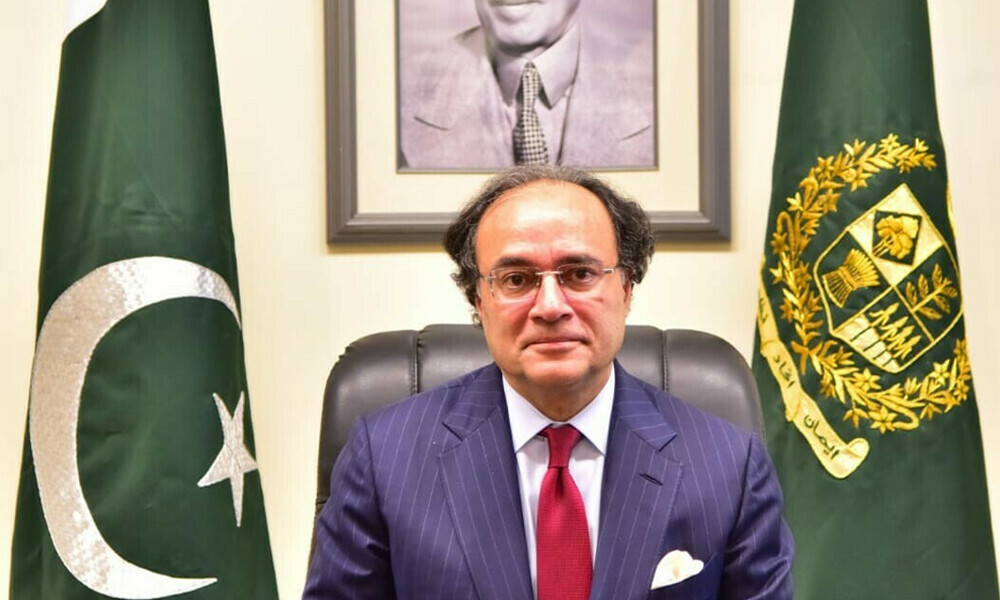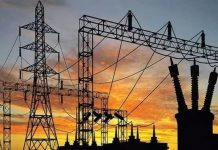By Ali Imran
ISLAMABAD: Minister for Finance and Revenue, Senator Muhammad Aurangzeb on Monday said that Pakistan’s economic direction had been set right through a series of structural reforms, which were now being operationalized to ensure sustainable and inclusive growth.
“I believe there is a broad consensus that we have made significant inroads and achieved considerable progress in terms of macroeconomic stability,” he said while addressing a joint news conference on economic reforms.”
Minister for Finance and Revenue, Senator Muhammad Aurangzeb was accompanied by Federal Minister for Power Awais Ahmad Khan Leghari, Federal Minister for Information Technology and Telecommunication Shaza Fatima Khawaja and and Adviser to the Prime Minister on Privatisation Muhammad Ali , Federal, Secretary for Finance, Imdad Ullah Bosal and Chairman Federal Board of Revenue (FBR) Rashid Mahmood Langrial here in FBR, Headquarter.
Aurangzeb said the government had achieved macroeconomic stability, backed by external validation as three leading international rating agencies upgraded Pakistan after a gap of three years. “These agencies are now aligned not only on where we stand but also on our positive outlook,” he added.
He said the successful completion of the second IMF review and the subsequent staff-level agreement in Washington reaffirmed that the country’s economic trajectory was on the right path.
“When the exchange rate stabilizes, foreign exchange reserves rise, inflation declines, and the policy rate comes down, the benefits are evident for industries,” the minister remarked, adding that investors had repatriated more than four million dollars in profits and dividends.
Aurangzeb said investor confidence was crucial for attracting new foreign direct investment (FDI). “Until our existing investors are satisfied, we cannot talk about further FDI,” he said, adding that the government had moved in the right direction toward stability.
Highlighting the next phase of economic management, the finance minister said Pakistan must now focus on avoiding historical boom-and-bust cycles and move toward sustained and inclusive growth. “Alhamdulillah, Pakistan today stands at a unique confluence of economic stability and favorable geopolitical tailwinds,” he said, pointing to stronger trade and investment opportunities with China, the United States, and GCC countries.
He stressed that structural reforms were indispensable for achieving sustainable growth.
The minister said the government’s reform agenda covered key areas including taxation, energy, restructuring of state-owned enterprises (SOEs), privatization, rightsizing of the federal government, digital transformation, debt management, and pension reforms.
“These are the areas consistently highlighted by analysts, think tanks, and our bilateral and multilateral partners,” he added.
Meanwhile addressing the press conference, Chairman Federal Board of Revenue (FBR) Rashid Mahmood Langrial said that FBR faced a shortfall of Rs 275 billion in four months and Tax to Gross Domestic Product (GDP) increased by 1.49 percent in one year.
The Chairman said that the tax ratio from provincial revenue and Petroleum Development Levy (PDL) has to be taken to 18 percent and 15 percent revenue has to be collected from the federation and 3 percent from the provinces.
Langrial said there is not as much pressure on the provinces as there is on the federation for revenue and this year, individual tax return files increased by 18 percent.
He said the number of tax return filers has increased from 4.9 to 5.9 million and the FBR had taken approval for transformation since November.
He said that data says the income tax gap is Rs 1.2 trillion and according to data, the income tax gap of the top five is Rs 1.7 trillion.
The tax collection rate in the tobacco sector has been increased and there is a huge list of options on which work has been done in the FBR, he said.
Major tax reforms have been implemented and the government is committed to broaden and deepen the tax net for tax revenue collection.
Adviser to the Prime Minister on Privatization Muhammad Ali said that Privatization is a serious issue which is not only for the sake of privatization but it is necessary for institutions and market competitiveness.
Muhammad Ali said that a lot of work has been done for privatization in the last four months and a large-scale change has been made in the Privatization Commission.
He said that in the Privatization program 24 institutions are to be privatized and the first Women Bank was sold at a valuation of Rs 5 billion.
The total value of First Women Bank was Rs 3 billion and the UAE Company that the bank bought has now come to Pakistan, he said.
He said the first phase of the transaction for the privatization of Pakistan International Airlines (PIA) could not be achieved and there are now four consortium for the privatization of PIA.
The Adviser said that those groups are coming for privatization that have a lot of experience and the efforts are being made to privatize PIA before the end of the year.
Muhammad Ali said that three companies were selected for the privatization of DISCOs and this a large and important sector with which every sector of the economy is linked.
A huge restructuring plan has been made and Privatization of DISCOs is a challenge for which efforts are underway, he said.
The adviser said that efforts are being made to privatize the Agricultural Development Bank of Pakistan (ADBP) and the financial adviser has been appointed in this regard.
He said that management of airports in the world is always with the private sector and work is being done on long-term agreements for Islamabad, Lahore and Karachi airports.





